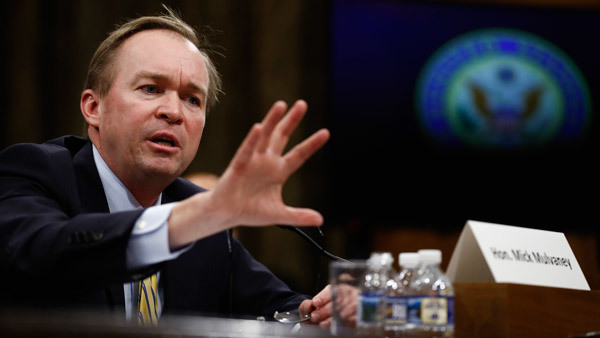
Acting CFPB Director Mick Mulvaney already has instituted changes at the agency that threaten the stability of the Lower East Side People’s Federal Credit Union, the credit union says in new court documents seeking Mulvaney’s ouster.
“Mr. Mulvaney’s actions in his short time in office have already harmed the Credit Union, harmed its ability to plan for future compliance, and harmed its mission of improving the financial health of underserved communities,” the credit union said, in documents filed in U.S. District Court for the Southern District of New York.
The credit union has filed suit contending that President Trump’s appointment of Mulvaney, an outspoken critic of the CFPB, as interim director was illegal.
The credit union argues that Leandra English, the agency’s newly appointed deputy director, should be running the agency under the Dodd-Frank Act. However, the administration contends in this suit and another filed by English, that the Federal Vacancies Act gave President Trump the authority to make the appointment.
When agency Director Richard Cordray resigned, he appointed English as deputy director. Cordray and English argue that under Dodd-Frank, English is the proper acting director since the law states that the deputy serves as director when the director is absent or unavailable.
The credit union is asking for an injunction prohibiting Mulvaney from serving as director. English has filed a similar suit.
The credit union said that as one of his first acts, Mulvaney is reevaluating certain reporting requirements under the Home Mortgage Disclosure Act.
Lower East Side credit union CEO Linda Levy said that banks comply with the Community Reinvestment Act—in part– by depositing funds in the credit union, which then provides services and loans to low income communities.
She said her credit union currently has about $2.5 million in such deposits.
“Regulators rely on accurate HMDA data, among other data, to examine banks for CRA compliance,” Levy said. Without such data, regulators may have difficulty in assessing banks’ CRA compliance.
And the credit union said that Mulvaney also delayed the enactment of rules governing prepaid cards—an action that lowers the quality of financial products available to underserved communities.
Some credit union members are paid by their employers through the use of such cards, the credit union said.
The credit union also renewed its argument that the Dodd-Frank Act requires that the deputy director of the CFPB takes over the agency in the absence of its director.
“This is neither the time nor the forum for defendants and their amici to rewrite the statute,” the credit union stated. “They can go to Congress to rewrite the law. Under current law, when Director Cordray made himself both absent and unavailable, Ms. English was the Deputy Director. That is undisputed.”
In its reply, the Justice Department reiterated its belief that the credit union has no standing to sue over the appointment. The department said that the credit union has not been able to demonstrate that their members will be harmed as a result of the appointment.
And the Justice Department said that the credit union mischaracterized the CFPB’s recent HMDA announcements. Neither policy changes the obligation of entities to follow HMDA. Instead, they simply change certain HMDA reporting requirements.
NAFCU and CUNA support Mulvaney’s appointment as acting director. The lower east side credit union does not belong to either organization.


